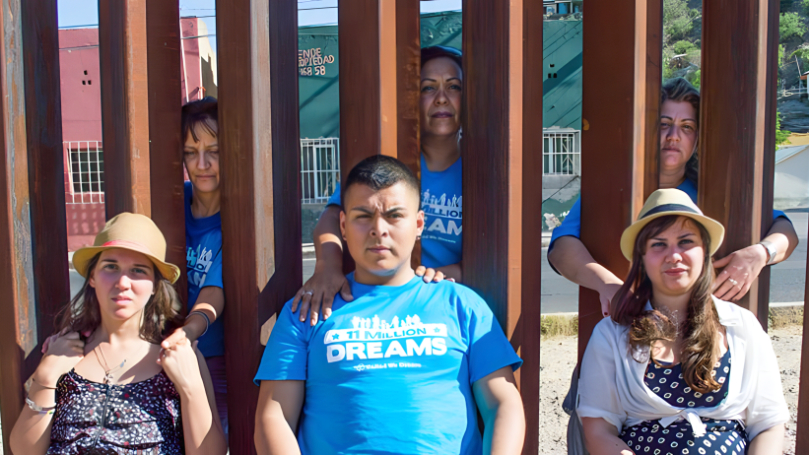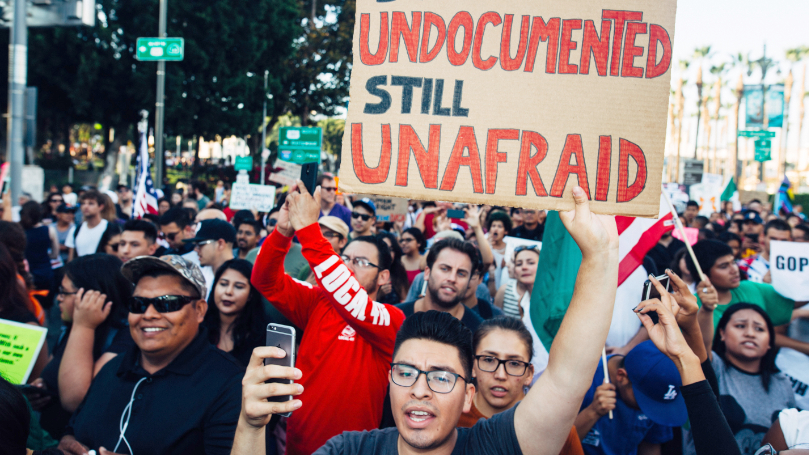
A working-class position regarding issues on the border demands full rights for workers and their families, documented and undocumented immigrants, and an end to oppressive immigration policy that justifies and normalizes persecution through state-sanctioned violence. We demand comprehensive immigration policy that upholds the dignity of the labor that both documented and undocumented immigrants contribute to the U.S. economy. Furthermore, our opposition to the violence and political destabilization that U.S. imperialism is imposing on countries throughout the Americas further requires us to demand sanctuary for economic refugees.
During the last election, the question often came up: “Aren’t Democrats and Republicans just the same on issues of the border?” The answer is, there are a lot of bad actors in both parties. Both political parties are dominated by monopoly capital, although by different sectors, and working-class and democratic movements also exercise influence in the Democratic Party. How do we know who and what to support from a working-class perspective? This article will attempt to address these questions.
Legislation proposed by Congress in recent years has included large increases in border militarization in exchange for a pathway to legal residency and citizenship for immigrant community members. Current U.S. policy emphasizes militarization and deterrence, and it violates the rights of people of color in the borderlands. This contributes to the death and suffering of migrants and refugees.
Let’s look at this issue using the framework of some of the important points of the party program — unity, and fighting racism:
“Working class and democratic struggle is the key to progress — we must have a more unified working-class and democratic movement to elect more candidates that will move us toward fair and just immigration reform and demilitarization of the border.”
The reality is that the policies of Democrats and Republicans make a huge difference in the lives of immigrants. Currently, far right Republicans have introduced a hard line bill in the U.S. House, the “Border Safety and Security Act,” that would ban access to the asylum process if there is not enough detention space to hold the migrants in the U.S. This bill is predicted to die in the Senate, but shows how far apart the parties are in their basic positions on immigration reform and enforcement.
The Biden administration initially announced its intention to lift Title 42, a Trump era rule which used the pandemic as an excuse to limit entry of asylum seekers. Under pressure from the right-wing courts, the administration has taken a much more vacillating position, but there are 70 Democrats in Congress who have pushed back on Biden’s continued use of Title 42.
Bill Clinton began the deadly ‘Prevention through Deterrence’ policy and the militarization of the southern border with the implementation of Operation Gatekeeper in October, 1994. This was meant to bring the border ‘under control’ during a wave of anti-immigrant sentiment, much like we see today. During the Obama administration, 3 million people were deported and the president became known as the Deporter-in-chief. This was wrongly done, seemingly to placate the right wing, with the hope that comprehensive immigration reform would be achieved.
During that same era, many positive executive actions benefited members of the immigrant community living in the United States. Congress was gridlocked over passage of comprehensive immigration reform then, as it most likely will be again this 2023–24 session.
Through executive action, however, Obama implemented Deferred Action for Childhood Arrivals (DACA) for many young Dreamers. And prosecutorial discretion memos — executive actions made by both Obama and Biden — for those in deportation proceedings has allowed many in immigration court proceedings to have their cases closed or dismissed.

Under the Biden administration, the Department of Labor has partnered with DHS (Department of Homeland Security) to approve a process for, and move forward on, deferred action for immigrant workers experiencing abuses by employers. Many more people were impacted by Trump’s racist border policy and bans on immigration. As a party, we need to remain vigilant and be ready to advocate for just and fair reform to current immigration law. And we must be ready to fight for demilitarization of the borderlands.
Currently, the Biden administration is proposing a rule that will dramatically limit access to asylum for people arriving at the U.S.–Mexico border. The rule limits access to people granted prior permission and who can pay for a plane ticket, those who can use an app to make an online appointment (the app has lots of problems, discriminating against families and people of color), or those who seek asylum first in countries through which they transited. Public comment on the rule was only allowed for 30 days. That window has closed and the decision is yet to be announced as of this writing.
Considering who has been granted refugee status in the past, and which conflicts are considered worthy of consideration, such practices highlight the prejudicial nature of U.S. government policy when it comes to the granting of refugee status. For example, Cuban dissidents “fleeing Communism” were granted access, while those escaping U.S.-imposed drug wars from Mexico to Colombia, or anti-popular governments from Haiti to Guatemala, are not. It also shows the racist contradictions of U.S. democracy, as many seeking “liberty and justice for all” are turned away, while others are welcomed.
It makes sense as a party to support specific recommendations included in the recent report by the National Network for Immigrant and Refugee Rights (NNIRR). Some of these are:
- End U.S. immigration policy based on immigration deterrence, and terminate those policies, laws and practices stemming from this framework.
- Create long-term, rights-centered channels for regular immigration; implement the Global Compact for Migration to allow for safe and dignified migration.
- Respect the international right to asylum (as stated by Article 14 of the Universal Declaration of Human Rights) and due process for all migrants; allow asylum seekers to await hearings within the United States. Reframe the border as a human security issue to protect the rights of all people, rather than treating it as a national security issue that ends up targeting low-wage workers and Black, Indigenous, and Latin-American immigrants.
- Humanitarian Aid & Rescue: Decriminalize all humanitarian efforts and aid given by community groups, labor, civil and human rights organizations, and advocates at the border. This includes rescuing migrants in the desert or mountains, and providing them with water, food, shelter, medical aid, and transportation to safety and treatment inland.
Crucial to why we are seeing high numbers of people seeking asylum or fleeing countries
suffering economic difficulties are the imperialist actions of the United States itself — particularly targeted against Cuba, Nicaragua, Venezuela, and Haiti, though the U.S. has never given up its position that everything south of the U.S.–Mexico border is part of its “backyard.” In addition to sanctions, the U.S. continues to destabilize the region through the imposition of right-wing governments (by means of coups and election interference), one-sided trade agreements, U.S. military bases, alleged drug trade countermeasures, predatory IMF loans, and other destabilizing, interventionist actions. For example, the U.S. has not supported the implementation on the ground of the Peace Accords in Colombia, leading to a destabilized economy and political situation there.
Actions we can take:
- Support immigrant-led efforts to demand the U.S. respect its own asylum and refugee laws and international asylum law
- Demand an end to sanctions that destabilize the economies of countries of the Global South
- Build coalitions with immigrant-led organizations and others advocating for fair and just comprehensive immigration reform, including laws that end border militarization and build up communities
- Demand resources be used not for border militarization, but for working class and people’s needs, including immigrants and people without legal status in the U.S.
Images: DREAMers travel to US/Mexico border to see their mothers by United We Dream (Facebook); Defend DACA by Molly Adams (CC BY 2.0)
Related Articles
- ¡Alto a la represión y persecución de los migrantes en EE. UU!
- Stop the repression and persecution of migrants in the U.S.!
- CPUSA, Popular Socialists of Mexico: No walls or deportations!
- Imperialism hurts workers everywhere, including here in the USA
- Trump’s trade war: An international working-class response


 Join Now
Join Now